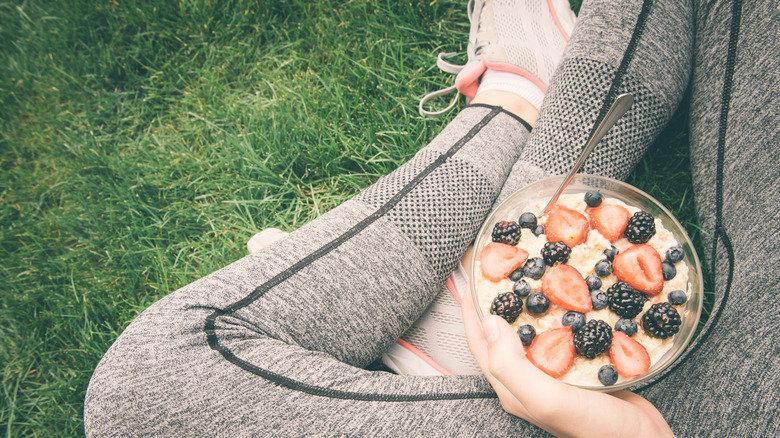What Kind Of Food Should You Eat Before Running A 5k?
Running a 5K can be an exhilarating experience that benefits your mind and body. Think of it as a way to challenge yourself and get out of your comfort zone. Aerobic exercise — including running — can boost cardiovascular fitness, improve your sleep, and put you in a better mood, notes WebMD. Over time, it can lead to a stronger immune system and a sharper brain. Runners also tend to be leaner and live longer than the average person, suggests a 2008 study published in the Archives of Internal Medicine.
Getting started is often the hardest part. The Mayo Clinic recommends alternating between walking and running. Also, you should take a day off or engage in active recovery once or twice a week, as well as before the race.
What you eat and drink matters, too. After all, there's a reason many athletes work closely with nutritionists and plan their meals ahead of time. For example, elite runner Alex Wilson prefers to eat a meal rich in protein and simple carbs, such as salmon with rice, the night before a race. Her daily meals consist of whole foods like oatmeal, chickpeas, leafy greens, and sweet potatoes — but she won't say no to an occasional treat, reports Runner's World. With that said, here's what you should eat before a 5K run so you can perform at your peak.
Fill up on carbs and lean protein before a race
The foods you eat prior to a race can make or break your performance. A 2015 review featured in the Open Access Journal of Sports Medicine suggests consuming about seven to 12 grams of carbohydrates per kilogram of body weight throughout the 24 hours prior to your workout. High-carb foods help replenish muscle glycogen stores, which in turn may delay fatigue and boost your endurance, according to clinical evidence published in the Journal of Physiology.
Also, try not to go overboard on fiber, as this nutrient may cause diarrhea, bloating, and gas when consumed in excess, warns Duke University. The last thing you want is to rush to the loo in the middle of a run! Your best bet is to eat high-carb, low-fiber foods. While consuming too much fat or protein is also problematic, you should enjoy a little bit of protein in order to keep satiated, recommends the Chicago Area Runners Association (CARA).
As a rule of thumb, opt for easily digestible meals, such as turkey wraps rather than salad, says CARA. The same goes for snacks — stick to high-carb foods with little fat and fiber to prevent digestive distress. Pretzels, granola bars, low-fat cheese or yogurt, and toast with peanut butter are all great choices. Try to have your last solid food between 90 minutes and 2 hours before your run.
Stay hydrated before, during, and after your 5K run
Last but not least, drink plenty of water before, during, and after your 5K run. Dehydration can affect physical performance, causing tiredness, decreased mental focus, and rapid heartbeat, explains the University of Utah. Surprisingly, many runners don't pay enough attention to this aspect, reports a 2011 survey featured in the Journal of Athletic Training. Nearly half of the respondents said they experienced dizziness, muscle cramping, or other symptoms of heat-related illness due to dehydration. Inadequate hydration may lead to heat stroke, muscle cramps, nausea, and stomach pain, all of which can ruin your race. In fact, heat stroke can be life-threatening.
The University of Utah recommends drinking at least one cup of water prior to exercise, and 4 to 5 ounces every 10-15 minutes during exercise. Weigh yourself before and after the race and try to consume about double the amount of fluid lost during physical activity. This equates to three cups of water for every pound lost.
Some runners turn to energy drinks, which may improve exercise performance, suggests a 2016 study published in the Journal of Strength and Conditioning Research. These beverages, however, may contain added sugar, high-fructose corn syrup, and fillers. Alternatively, you can opt for electrolyte drinks — but remember to check the nutrition label for hidden sugars.



